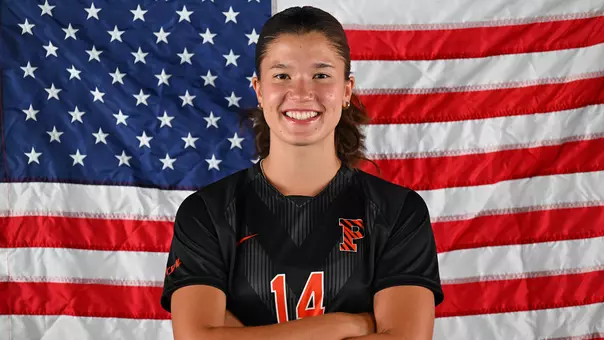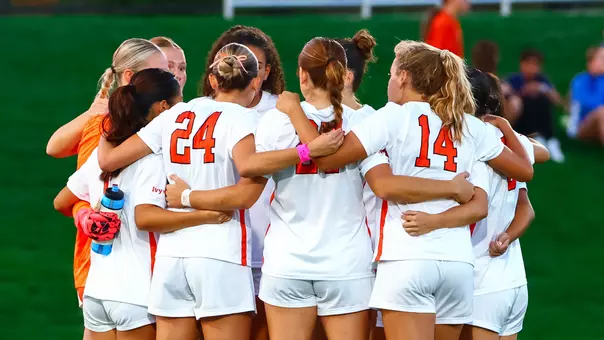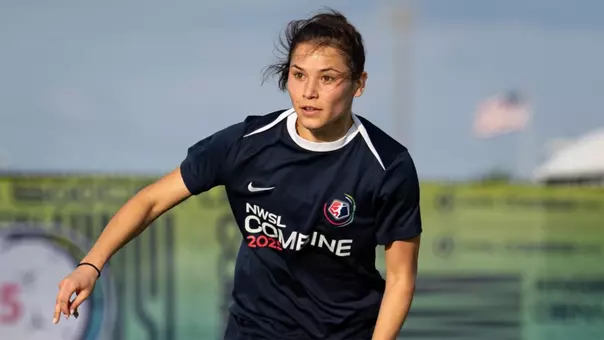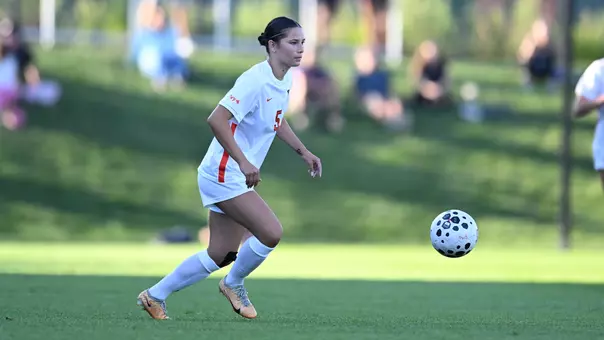Princeton University Athletics
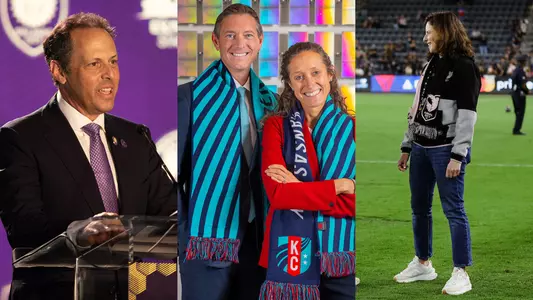
Feature Story: Princeton Leadership In The NWSL
September 07, 2022 | Women's Soccer
The little girl — Kara is her name — settled into her seat and looked out at the scene in front of her, and, perhaps even more so, the scene around her. She was wide-eyed and mesmerized and far too struck by her environment to say a word. Her mouth instead hung open, in what was half of a smile and half of her little jaw on the floor.
She wasn’t the only one having this experience. In fact, she was sharing it with 87,000 other children, all with the same face, all 87,000 of them wide-eyed and mesmerized as well, all of them part of something that would have been unimaginable in the past.
And so what if, to borrow a phrase from another festive occasion, these were children “from one to 92.” On this day, in London’s Wembley Stadium, they were children nonetheless.
This past July 31, England defeated Germany 2-1 on a goal in extra time to win the UEFA Women’s championship. It was the biggest win by an English national team since the men won the World Cup — back in 1966.
The Lionesses, as they were known, captivated the entire country with the win. Attendance at Wembley was officially 87,192, which was a record for any UEFA final, men’s or women’s, not to mention more than three times what attendance had been at the previous final in 2017 and more than five times what it was in 2009.
Prince William greeted the players on the field afterwards. The game was the most-watched soccer game in England this year, more than any Premier League match or World Cup qualifier.
The BBC was flooded with coverage. The radio featured caller after caller who talked about how inspiring the team was and how little English girls will now have greater opportunities to play as well. The usually brutal newspapers gushed with national euphoria: “England’s Pride,” was the front page headline in The Times, while The Sun had a full page team picture with the trophy and the headline “Move Over Fellas… It’s Home.”
About 24 hours before kickoff, she was Kara Nortman, business leader and entrepreneur, and the woman chosen by UEFA to be the keynote speaker at a forum around the event. Then she went back to being the little girl in the stands named Kara.
“I felt like a little girl,” she says. “I was giddy. I had chills down my spine.”
About 8,000 miles south, in Capetown, South Africa, Chris and Angie Long and their four children were gathered around the television watching.
“It was electric,” Chris Long says.
Mark Wilf was unable to watch the game, but its impact was not lost on him.
“Sports,” he says, “can be a very important driver of social change.”
Nortman, Wilf and the Longs — all Princeton alums — are hardly casual fans. No, as women’s soccer explodes internationally, they are drivers of the movement. They are all owners of teams in the National Women ’s Soccer League, which has a huge Princeton presence on the field and in management.
Nortman is the co-founder of Angel City, the Los Angeles-based team in the NWSL. Angel City was the first majority female-owned professional sports franchise in the United States. One of the team’s best players is Tyler Lussi, the all-time leading scorer in soccer — men’s or women’s — in Princeton history.
Wilf is the owner of the Orlando Pride. The Longs, whose first date was at Winberries when they were Princeton undergrads, are the owners of the Kansas City Current.
The three teams are part of a league whose growth has been dramatic and whose future is seemingly limitless. They were all drawn to ownership by a common set of values and beliefs about the power and importance of women’s athletics, and their time at Princeton was an important keystone in their development.
“Ownership of sports franchises is a form of stewardship,” Mark Wilf says. “These are all community assets in so many ways. At Princeton, you learn in an atmosphere of public service, public good. Princeton prepares you well for those enterprises.”
They are NWSL rivals, but it is a friendly rivalry. They have the bond of being major forces in the direction of the league and with it the ability to help grow the game. They are philanthropists. They have much in common, including daughters who play soccer themselves.
Still, as would be expected, they have vastly different stories to tell.
* * *
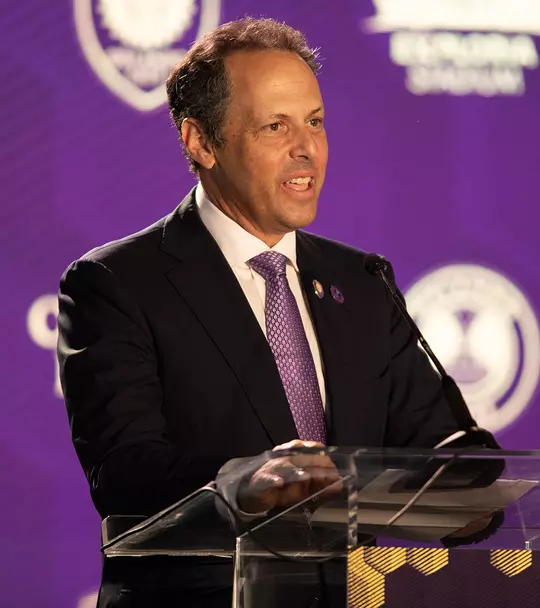
The city of Lviv sits in the western part of Ukraine, about 45 miles from the Polish border. Throughout history, perhaps no border anywhere else in the world has been as ever-changing, and so it was in the 1930s that Lviv was actually part of Poland instead.
Mark Wilf’s mother Elizabeth grew up in Lviv. In the years before World War II, the population of Lviv was 315,000, or less than half of what it is today. Of those 315,000 residents, approximately 110,000 were Jewish. By 1941, Jewish refugees had made that number closer to 160,000.
When the Soviet Red Army liberated the city in 1945, fewer than 100 were still alive, the rest victims of the Nazi Holocaust. Elizabeth and her family were lucky. They escaped from the Lviv ghetto and worked as polish farm workers. Her father was hidden under the floorboards of a barn for more than two years.
“Every day,” Mark Wilf says, “they didn’t know if they’d make it to the next one.”
Mark’s father Joseph Wilf, who also was originally from Lviv, spent much of the war in a labor camp in Siberia. He too was one of the fortunate ones to survive. He would meet his future wife after the war in Germany, in a displaced person’s camp. Both sides of Wilf’s family lost members during the Holocaust.
The Wilfs would come to Birmingham, Alabama, sponsored by the Jewish community there. Joseph Wilf and his brother Harry would start a real estate business, and it would grow to become hugely successful.
“They didn’t talk about what they’d been through much,” says Mark Wilf, who has traveled to where his parents grew up. “They wanted very much for us to have our lives and move forward.”
He and his brother have done just that. They also have not forgotten what their family went through during the war. It is probably why there is a unmistakable sense of empathy and compassion to him.
“That background drives me a lot,” Wilf says. “It’s about taking nothing for granted. A left turn instead of a right turn made the difference between life and death.”
In addition to building his business, Joseph Wilf was also a big soccer fan. After the family relocated to North Jersey, Joseph would take his sons Mark and Zygi, to see the Cosmos play at Giants Stadium in the 1970s, back when the team had players like Pele, Franz Beckenbauer and Giorgio Chinaglia. In those days, the Cosmos were as big as it got in the New York area, and the old stadium in the Meadowlands was often packed on game days.
With that as his background in the sport, Mark Wilf went off to Princeton as part of the Class of 1984. While a student, his love of athletics in general led him to WPRB, where he worked on pretty much everything, which is the way it usually is at a student-run radio station. His favorite part of the experience was getting to do play-by-play for Princeton football and men’s basketball.
“I’ve always loved being around sports,” he says. “Sports energize me. They have so much drama. There are so many parallels between sports and life, the teamwork, the community, the leadership, the values.”
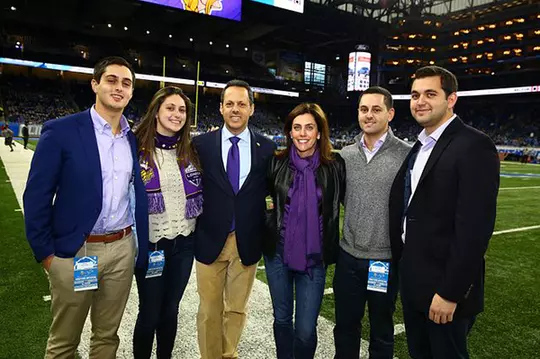
As Wilf went down the path of his own successful business career, he has kept those tenets in mind, including with his support of Yad Vashem, the Holocaust memorial in Israel. He also serves on the Board of Directors for the Princeton Varsity Club.
He became president and co-owner of the Minnesota Vikings in 2005, trading in his allegiance from the Giants, his childhood team. This time of year is energizing for him, with a new season on the horizon. This season is also the first for new general manager Kwesi Adofo-Mensa, himself a Princeton alum whom Wilf has brought in to run the team.
“It was a little awkward at first, but it’s all purple and gold for me now,” he says. “I have tremendous respect for the Giants’ organization, but I’m all Minnesota now. In business, it’s not always easy to measure success and failure. In football, it’s right there, clear as day, every Sunday. We’re very excited for this year.”
He originally tried to bring an MLS team to Minneapolis in the stadium that he built for the Vikings, but he lost out to a different ownership group. Undeterred, he first became involved with the Nashville team in MLS before becoming the owner and chairman of Orlando SC. Once in the Orlando community, the operation was expanded to include the Pride, as well as the academy teams for both the men’s and women’s franchises.
The Pride is more than just a business investment for him. The entire enterprise is so much more than that.
“I’m optimistic and positive about the future of this league,” Wilf says. “There is an excitement and passion around growing the game around some great issues, including women’s empowerment, social change and having a just and tolerant society. Those are issues that resonate with the players and management, and I really wanted to part of that.”
* * *
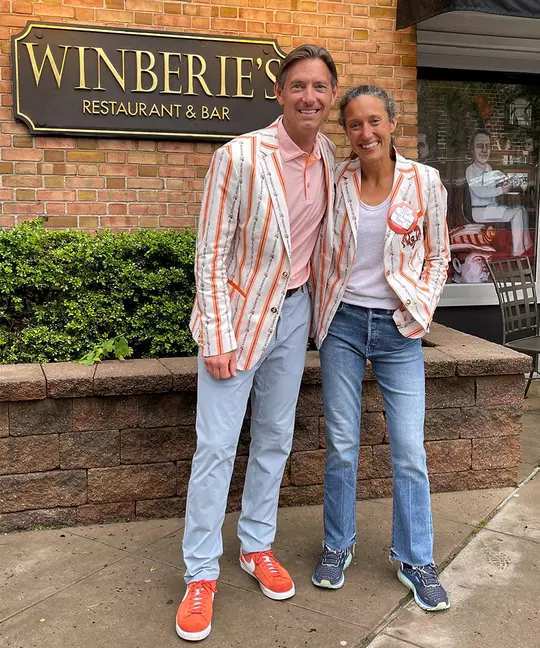
Chris Long had a problem set, and a problem. The problem set was for his corporate finance class, and it was due the next day. The problem was that he was hungry.
He decided to ask someone else in his class — her name was Angie — to grab a bite before they worked together on the problems. They went to Winberries.
That was a quarter-century ago.
Today they are Chris and Angie Long, both Princeton Class of 1997. Angie was a soccer goalkeeper in high school who turned first to golf and then, when she missed team sports too much, to rugby, becoming a two-time national champion and an All-American. Chris was a basketball player, a three-point shooting guard who played for Pete Carril.
Whatever they learned in that corporate finance class, it definitely stuck. They’ve both had extraordinary careers in the business world, and together they run Palmer Square Capital Management, headquartered in Mission, Kansas, not far from Angie’s hometown of Kansas City. It’s not hard to figure out where the company name originated.
“We are a massive sports family,” Chris says. “Playing. Spectating. It’s what we do.”
The Long family traveled to France in 2019, to see one of their daughters play in a youth event and to watch the Women’s World Cup. The soccer bug they caught there has resulted in the Kansas City Current.
“It was amazing to see the global nature of it,” Chris says. “More notably for us, when they would show shots of the United States, they were flashing to downtown Kansas City, and you could see everyone was going berserk. When Angie and I got back, we said we had to get a team in the city.”
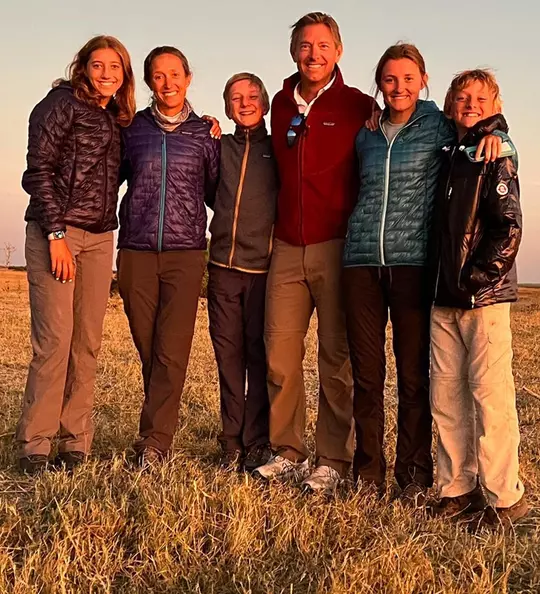
Their efforts paid off when they were granted an expansion team in 2020, right in the middle of the pandemic. The team debuted in the 2021 season and moved into the soccer specific Children’s Mercy Park stadium for this season. Attendance has been steadily growing, and a game against Angel City in mid-August was the first crowd to top 10,000 fans for a Current game at the facility.
Up next is the team’s own facility, a $120 million facility to be built on the Berkeley Riverfront off of downtown Kansas City. When completed in time for the 2024 season, the 11,500-seat facility will be the first stadium built specifically for a women’s professional soccer team in the world.
“Women’s soccer as a product is one of the best out there,” says Chris, who earned an MBA from Harvard Business School in 2005. “For a long time, it was hard to figure out where the games were being televised. It’s not like people didn’t want to watch. They couldn’t. Now you have investment and a tailwind driving opportunity, but it starts with the product. It’s all story-telling at some point. You have the product, and now you have the vehicles to tell the stories. Women’s athletes are some of the most talented out there.”
The story is getting out. And it’s generating the funding and interest to keep it on the rise.
“We have 12 teams now, and we’re likely to expand to 14,” Chris says. “We have 15 cities who want to have expansion rights. This is the best league on earth for women’s soccer. It’s growing its international presence. We’ll have a new media deal in 2023, and then you have the Women’s World Cup coming up. From a valuation perspective, an engagement perspective, the league is a rocket ship.”
Part of the fuel that fires the rocket ship is community outreach, something the Current does extremely well. The team’s promotions include a media game, in which 45 media reps will compete at halftime. It’s genius — bring the media in to play and let them see what goes on.
“Think of whatever cool things you can do around a game,” Chris says, “and it’s happening. Game nights are just magical. Really the hardest part is to get over the mindset. When Angie and I look at women’s soccer, we think in terms of growth in multiples. We are looking to overcome some old school mindsets. We’re not looking to do five percent growth. We want to do five times, 10 times. How do we get there? We’re always asking that.”
Even from the Midwest, they are still very close and very loyal to the campus where they met. They’re both Princeton Varsity Club Lifetime Members and devoted University citizens. They both have an extraordinary respect for how the athletic program runs.
“The coaches at Princeton bar none are amazing,” Chris says. “The ‘Team Around The Team’ has done an incredible job of helping to bring what has always been such a gem to the larger University population. The quality of women’s athletics has always been there. Now you really have everyone supporting it.”
* * *
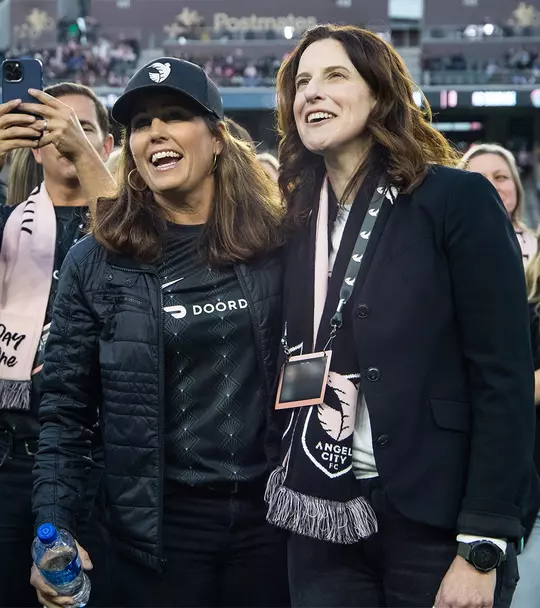
Kara Nortman was supposed to call at 3. Now it’s 3:05. Of course, she’s on Pacific time. Did she mean 3 Pacific? Is she not supposed to call for three more hours?
“Kara,” the email begins, “is it supposed to be Eastern or …”
Then the phone rings. It’s Kara Nortman. She apologizes for being a few minutes late. There was another meeting. Not a problem, she is told.
Then she starts to talk. She says three words in the time it takes most to say one. She completes one thought and flows into the next. Her speech is a mix of authority, enthusiasm, energy, knowledge, humor and passion. She laughs — a lot. It’s impossible to talk to her for more than a minute or so and not immediately understand why she has been so successful in whatever she has touched.
Nortman’s resume is one impressive entrepreneurial accomplishment after another. A 1997 Princeton grad as well, she earned her MBA at Stanford. She is currently a partner at Upfront Ventures, the largest venture capital firm in Los Angeles. She also helped found All Raise, a venture capital group that works to increase diversity in the field.
She also talks about sports the same way as her fellow Princetonian NWSL owners do.
“I always had a lot of joy and identity around the sports I played,” she says.
She grew up in Southern California playing basketball, softball and volleyball, and she attended a small all-girls school that “didn’t make me have to be all that fierce to be an athlete.” Her school then merged with Harvard-Westlake, and suddenly her small school was a big school playing some of the best athletic powerhouse schools in the state.
“We just starting getting crushed,” she says. “When I got to Princeton, I knew I wanted to play a sport. I tried to walk on to the basketball team, but that didn’t work. I signed up for rugby, skiing and rowing. I figured I could do everything. Then I realized I actually had to go to classes and do the work, so I had to cut that back.”
She stayed with the rowing program, becoming part of the army (navy?) of Princeton rowers who never made it to the first boat but who nevertheless had a formative experience that they wouldn’t change for anything.
“I was a third boater through and through for four years,” she says. “You can ask [women’s open rowing coach] Lori Dauphiny about my actual rowing skills. But it was such a blessing for me to be part of it. That was my community. I struggled for four years, but Lori was always there for me. She gave me so much, even if I wasn’t one of her better rowers. I attribute my self-esteem to Princeton Athletics.”
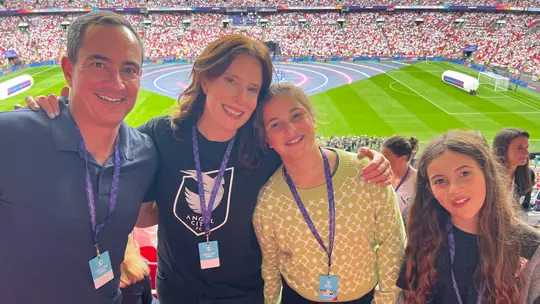
She was hooked on soccer by the 1999 World Cup, with the championship game in the Rose Bowl. That was the Brandy Chastain sports bra moment, which might be the single most important moment in women’s athletics history. She continued to be a fan as she had three daughters of her own, all of whom are athletes.
She followed the Women’s World Cup intently every four years. When she was in position to try to help grow the game, she leapt at it.
“I started with Angel City because I wanted to feel like I did as a fan at the World Cup,” she says. “When Angie asked me if they should do this too, I put her in touch with the people who had helped me. It was the first time in my life that the ‘old girls network’ did something like this.”
She was asked to talk about her experiences with Angel City as part of her keynote speech in England at the Euros. Her address was typical Norty, as she is called by some of her friends, which is to say vibrant, poignant and captivating. She too talked about the inability in the past to watch women’s professional games, mentioning the “tiny” players on the screen during video streams.
Now she leads a model NWSL franchise. The ownership group is an impressive one, including Billie Jean King, Natalie Portman, Serena Williams, and a host of former soccer greats, including Mia Hamm (who holds an honorary degree from Princeton).
Angel City has been an incredible success. The team leads the league in average home attendance at nearly 19,000 per game. The league as a whole averages nearly 8,000 fans per game, which makes it the most attended professional women’s league in the world.
“People say to me all the time, sheepishly, that they never thought women’s sports were going to be interesting,” she says. “After a game, they’re like ‘wow, that was amazing.’ For me, Game Night is electric. Game nights are my favorite time in the universe. I look forward to them. My family looks forward to them. I get there early and go to the fan fest. I don’t feel the stress of winning or losing until the whistle goes off. I go early and enjoy the community we’ve built. Sometimes I see the players as they drive in and give them a thumbs up. I’ll kick a ball with some of our coaches. You have to be able to have the moments where you enjoy things. Then I get serious. I like to sit in the empty stadium by myself for five or 10 minutes and appreciate it.”
* * *
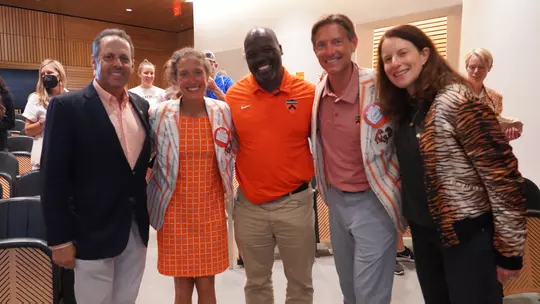
The Class of 1997 celebrated its 25th Reunion this past May. It brought the Longs and Kara Nortman back to Princeton, where they participated in a roundtable discussion about the NWSL and women’s athletics. Based on the relationships they developed as team owners, they called up Mark Wilf and asked him to join as well.
It was a well-attended and highly successful part of Reunions. Afterwards, they all watched the first Angel City-Kansas City game.
They couldn’t be there in person, but there will be many others. With the momentum that has been generated across the sport, punctuated by the recent Euros, all signs are pointing upwards. And with the Princetonians who are involved, who would ever think their force of will won’t be able to make it happen.
From Princeton to the NWSL, women’s athletics in this country doesn’t have many more important friends than that.
— by Jerry Price

.png&width=24&type=webp)



